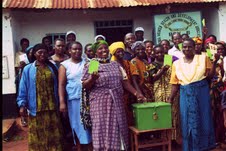Last night I had an experience that is sure to be a memorable one—I got to see President Barack Obama speak to an intimately filled room of supporters. I must say that his speech left quite an impression on me. Sure he focused on the usual topics of increasing jobs, healthcare reform, and bettering our education system, but it was much more than that. Obama pointed out some of the changes and reforms implemented by his administration and noted some of the hindrances. All of this led to one powerful inclination in my mind that is useful beyond politics and is necessary in addressing any social and/or economic issue currently seeking attention around the world—the need for innovation.Putting Innovative Thinking into Action
There are so many issues and initiatives that can be discussed in terms of innovative thinking, but for today I would like to highlight that of microsavings programs to increase financial opportunities for those affected by poverty. CARE, an international humanitarian organization, has been a leader in creating sustainable microsavings programs in Africa called Village Savings and Loan Associations (VSLA) that have provided women with empowerment to take control of their futures by helping themselves, their families, and their communities change the perverse cycle of economic disadvantage to a prosperous cycle of growing income, greater health, and better education. I should also mention that it gives women a voice, strength in societies where gender oppression is prevalent. Women who live in these communities and participate in VSLAs are taught a system of collectively pooling and managing money that can be used for savings and loans to meet household needs, finance income-generating businesses, pay for emergency expenses, and ultimately pull their communities out of poverty.
CARE trains the women in how to manage and start a microsavings program over the course of a year intensive and then the women themselves sustain it. The women collectively contribute money to a “savings box” on a weekly basis, building it up over time. Then they are able to provide small loans (with interest) to the women who need it for household, educational, and business expenses. CARE reports a 99% pay-back rate to the savings accounts—so it is reliable. Furthermore, men have begun modeling the systems led by the women to create similar programs. You can read more about the programs and effectiveness here. To date, CARE has launched over 54,000 VSLAs where they have helped women accumulate over $14 million in savings—that is what I call innovation!
time. Then they are able to provide small loans (with interest) to the women who need it for household, educational, and business expenses. CARE reports a 99% pay-back rate to the savings accounts—so it is reliable. Furthermore, men have begun modeling the systems led by the women to create similar programs. You can read more about the programs and effectiveness here. To date, CARE has launched over 54,000 VSLAs where they have helped women accumulate over $14 million in savings—that is what I call innovation!
A smart investment for the United States government to make would be in programs such as VSLA and taking notice of the great work CARE is doing to create sustainable economic opportunities through the empowerment of women for the greater good of the larger communities. Sure, we have “our own problems to worry about,” but investing wisely in foreign assistance will not only help us to build allies and save lives, but also to save money in the long-run. Is it better to invest in such programs now or wait until chaos erupts to send in the money…and troops…to attempt to diffuse life-threatening situations? I vote for the former. By the way, I just learned that only 1% of the total U.S. budget is allotted to foreign aid assistance—is that really taking away from monies allotted to the needs within our own country? I do not think it is.
I also think it would be useful to explore and create similar microsavings programs for other groups of individuals heavily affected by the conditions of economic instability. A focus on youth could assist in reducing school dropout rates and developing a new generation of role models and leaders for communities to pull themselves out of poverty. Innovation for Poverty Action (IPA) is currently in the process of researching the effectiveness of microsavings programs for Ugandan youth, as well as evaluating the effectiveness of youth financial literacy education on savings. These research projects will hopefully shed light into what might work and not work in youth empowerment programs aimed at obtaining financial stability for the greater good of their communities. All in all, microsavings programs are a creative and innovative way to reduce global poverty around the world through sustainable actions.
Cynthia Castaldo-Walsh is a Program and Research Intern with the SISGI Group focused on gender-based conflict, non-violence and peacebuilding for conflict transformation, and sustainability for conflict resolution.

